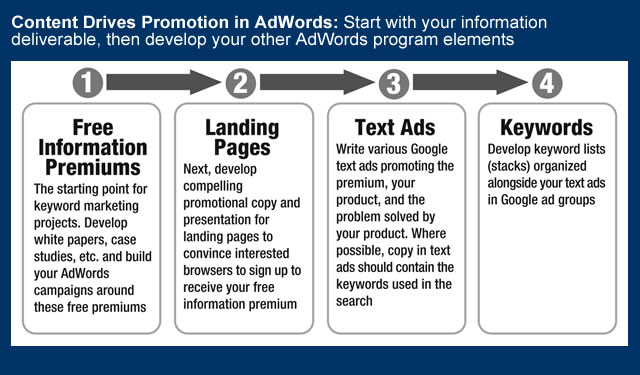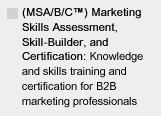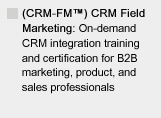MAKE SURE YOU CONTINUE TO RECEIVE EACH ISSUE OF TUESDAY MARKETING NOTES—CLICK HERE TO RENEW YOUR FREE SUBSCRIPTION
Success with Google AdWords: Developing Killer Content for Effective B2B Lead Generation Programs
by Eric Gagnon
Online advertising, particularly methods like Google AdWords keyword search advertising, give advertisers the immediate response and measurability they need to run accountable B2B marketing programs, with a speed and precision not found in print trade advertising or other, more traditional parts of your marketing program.
The vast majority of successful AdWords lead-generation programs in business-to-business markets use information-based promotions that motivate your potential prospects to provide you with their contact information in exchange for the free information you provide to them.
This exchange of valuable information to the prospect, in return for prospects agreeing to provide their contact information to you, reveals the fact that the quality and perceived value of the information premium you provide is the most important element of any AdWords keyword search program.
To Be Successful with AdWords, Start with Great Content
Every successful business-to-business AdWords marketing program begins with a great information deliverable. Because most AdWords marketing programs in B2B utilize these free, permission-based information premiums, and because your potential prospect’s perception of the value of this information is the most important factor in determining whether or not your AdWords program will meet your lead generation response goals, the best way to develop any keyword search program is to start first by developing the content deliverable you plan to provide to your prospects, before developing the rest of the actual AdWords program itself.
Content deliverables are often created specifically for AdWords marketing programs, since the point of running a keyword search program in B2B is to address the specific product, service, problem, concern, or business issue your prospects are using Google to search for and to solve.
The relevancy and quality of the information deliverable you use to help prospects solve their need or problem are the most important factors in motivating this prospect to ask for the information by contacting your company and providing you with their contact info; because of this, the content required must often be custom-developed, either from scratch, or by modifying your existing materials and content to serve this targeted purpose.
Your Content Deliverable Drives Your AdWords Promotion
Developing the information deliverable first not only makes the rest of the process of developing keywords and writing text ads for your AdWords program go much easier and faster, it often improves the quality of these promotional elements in your program. That’s because the process of researching, writing, and developing the content before you develop the promotion sharpens your perception of how your product solves the prospect’s business issue, problem, or other need the prospect is searching for.

By first gaining a solid grasp of the content needed to describe how your product or service helps your prospect solve their problem, the promotional elements of your program then come into view more clearly, and faster than the conventional approach of brainstorming keywords, writing text ads, and then developing the content premium as an afterthought.
How to Fail in Google AdWords: Dump Searchers on to Your Company’s Home Page
The alternative to using an information premium in AdWords and a sure way to fail in AdWords is to direct users to your company’s home page, or some promotional page on your site and hope that Web users will stick around enough to remember your company or, less likely—fill out their contact information to request a call from one of your company’s sales reps. The exception to this are companies who sell B2B products which are priced low enough to be sold directly online (for example, an industrial supplies cataloger), who link keyword searches for specific products directly to the corresponding product description or catalog page on their Web site.
What Do Your Prospects Want, and What Does Your Company Know that Gives Prospects What They Want?
The process of determining what purpose your information deliverable(s) should serve in your AdWords program begins by:
1.) Defining what your potential prospects want, and the problems and issues they experience that motivate them to search;
2.) Assessing what your company knows that addresses these searchers’
product “wants,” problems, or issues;
3.) Developing this knowledge into content that motivates these searchers to
become prospects;
4.) Finding the keywords your potential prospects use to search for products like yours, or problems to be solved by your product (this step becomes much easier to perform once you complete steps 1.), 2.), and 3.) above)
1.) Defining Your Potential Prospect’s Wants, Problems, and Issues
While you can’t always predict how your potential prospects will find your company on the Internet, you can narrow down the way they search for products such as yours into three general areas: Product “wants,” problems, and issues. These areas not only point the way to the keywords to use in your AdWords programs, they help you identify what your company knows that adds value to the products prospects are searching for, and how this knowledge can solve the problem or issue that prompted their search.
Product (or service) “wants” are names of products, product categories, product brand names and other keywords which are directly related to your product. They are usually the keywords which are most commonly used by Google searchers to find products like those sold by your company, and they’re the most obvious and identifiable keywords associated with your product: They’re the keywords you’d likely use first in your AdWords program, and they’re likely to generate a substantial share of the impressions and click-throughs in your AdWords marketing efforts.
Product problems or issues are the specific problems and issues your prospects are trying to solve which can be solved by using your product. Your potential prospects who have these problems (and enter keywords relating to them in Google) may not know they need a product like yours to help them solve their problem. If they don’t, then your information deliverable offered in your AdWords program is valuable because it helps them accurately define their problem, and may raise new questions related to their problem they may have never thought to ask, which also helps to authoritatively position your company and its product as the best solution to their problem. If a searcher already knows that a product such as yours can solve their problem, then your information deliverable can still help to position your company as more uniquely able to solve this prospect’s problem than your competitors.
For example, a company selling hydraulic pipeline systems designed to transport hazardous chemicals used in manufacturing processes might draw the interest of a plant manager who is searching Google for the solution to their problem: “how to prevent acid corrosion in valves,” in addition to the standard product-related keywords like “corrosion-proof valves.” An HR manager looking for companies to do pre-employment background checks on job applicants may commonly search by the product-related phrase “background checks,” but another HR manager or company attorney might also search on their specific problem, “avoiding negligent hiring practices.”
Being the First to Identify the Problem Puts Your AdWords Program on Top
Being the first to identify a problem can be a competitive advantage in keyword search marketing programs: While your competitors may probably be “all over” the most obvious keywords relevant to the products that both of you sell (and you’ll be bidding against them on the more common keywords in your industry), they may have failed to look deeper into the problems affecting all of your potential prospects, and which drives these prospects to the product they need.
By being the first in your field to identify with the prospect on their problem, and using a high-quality information deliverable to position your company as the best solution to their problem, you can be the first to convert this searcher to a prospect ahead of your competitor, and the first to convert this prospect to a buyer, if you maintain the high quality and relevance of your messaging and support consistently throughout your company’s lead development program.
Eric Gagnon (eric@realmarkets.net), a director with the Business Marketing Institute, is author of The Marketing Manager’s Handbook and The CRM Field Marketing Handbook, and president of GAA ( http://www.realmarkets.net ), an interactive marketing, turnaround, and product development consulting firm.








